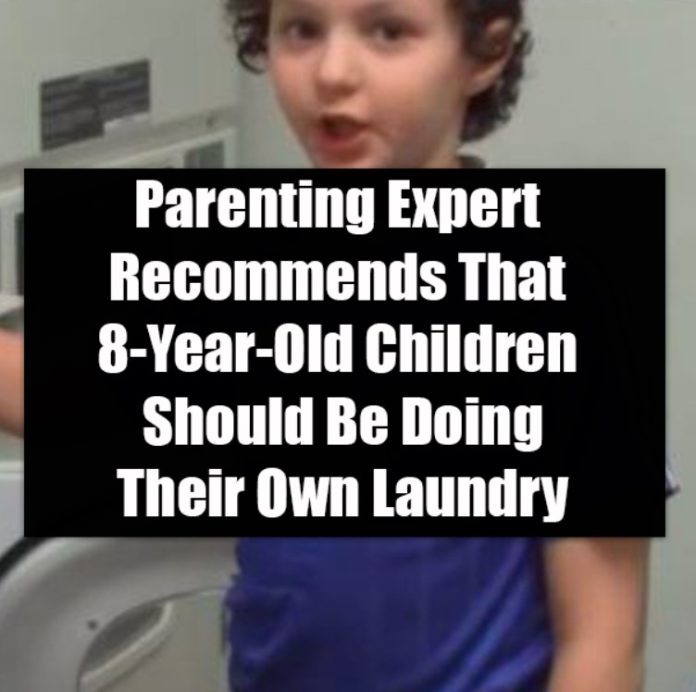Are Your Kids Doing Chores? Why Teaching Responsibility Starts with Simple Household Tasks
For parents, the question of whether or not to assign chores to their children is a perennial debate. Some argue that kids should enjoy their childhood without the burden of household responsibilities, while others emphasize that early involvement in chores helps instill discipline, responsibility, and self-sufficiency. So, where do we draw the line? Should kids really be expected to do their own laundry, or is that asking too much?
According to child development expert Dr. Deborah Gilboa, the answer is clear: children should absolutely be participating in household chores, and by the age of eight, they should be fully capable of handling their own laundry. While this idea might seem ambitious to some parents, Dr. Gilboa firmly believes that assigning age-appropriate responsibilities helps children develop into capable, independent problem solvers.
The Importance of Chores in Childhood Development
Dr. Gilboa isn’t alone in advocating for chores at a young age. Research consistently supports the idea that children who engage in household tasks from an early age tend to develop strong problem-solving skills, a sense of responsibility, and even better social skills.
When children participate in household responsibilities, they learn essential life skills that will benefit them well into adulthood. Tasks like making their bed, setting the table, and eventually doing their own laundry help kids understand time management, organization, and self-reliance. Parents may worry that giving their children chores will burden them, but in reality, these tasks serve as valuable learning experiences.
Teaching an 8-Year-Old to Do Laundry: A Step-by-Step Guide
In one of her Ask Doctor G series, Dr. Gilboa presents a compelling case for children’s independence by showcasing her 8-year-old son successfully completing a load of laundry at a laundromat. What makes this even more amusing is meant as a tutorial for college students—many of whom, shockingly, still don’t know how to properly do their own laundry!
The young laundry pro goes through the entire process methodically:
- Sorting Clothes – He correctly separates dark and light clothing to prevent colors from bleeding.
- Understanding Machine Settings – He reads the instructions on the washing machine to select the proper cycle.
- Measuring Detergent – He carefully measures the appropriate amount of liquid detergent and shares a handy tip: placing the detergent cap inside the machine helps clean it and prevents it from getting lost.
- Using the Payment System – He navigates the laundromat’s payment system, demonstrating a basic financial understanding.
- Transferring Clothes to the Dryer – He completes the final step of switching the washed clothes to the dryer and selecting the correct settings.
Though this process involves multiple steps, the 8-year-old executes them with ease, proving that doing laundry is a completely manageable task for kids of his age.
When Should Kids Start Doing Chores?
One of the most common misconceptions among parents is that chores should be reserved for older children. However, Dr. Gilboa asserts that even toddlers can participate in simple household tasks.
Here’s a general guide to age-appropriate chores:
- Toddlers (18 months – 3 years old): Holding the dustpan while a parent sweeps, putting toys in bins, wiping small spills.
- Preschoolers (4 – 5 years old): Making their bed, setting the table, feeding pets, organizing toys.
- Young Kids (6 – 8 years old): Sorting laundry, folding clothes, helping wash dishes, sweeping floors.
- Older Kids & Preteens (9 – 12 years old): Doing laundry independently, vacuuming, cooking simple meals, taking out the trash.
- Teenagers (13+ years old): Managing their own laundry, preparing meals, cleaning bathrooms, yard work.
By gradually increasing a child’s responsibilities, parents help them develop confidence and essential life skills. The key is to start small and be patient—what might seem like a minor task now can have long-term benefits.
Why Parents Should Encourage Chores
Some parents hesitate to assign household tasks, fearing their children will become overwhelmed or resistant. However, experts argue that shielding kids from responsibilities can do more harm than good. Children who grow up without learning basic chores may struggle with independence later in life. In contrast, kids who actively participate in household management tend to be more disciplined, confident, and prepared for adulthood.
Consider the common stereotype of the college student who doesn’t know how to do laundry. Many young adults enter college with little to no experience managing basic tasks, which can make the transition to independent living far more challenging. Teaching kids these skills early on prevents them from experiencing these struggles later in life.
Tips for Parents: Making Chores Fun and Engaging
If the idea of getting your child to do chores sounds like an uphill battle, here are some ways to make the process more enjoyable:
- Turn Chores into a Game: Set a timer and challenge your child to complete a task before it goes off.
- Use a Reward System: Offer small incentives like stickers or extra playtime for completing chores.
- Work Together: Kids are more likely to enjoy cleaning if they see their parents participating.
- Make it Routine: Incorporate chores into daily life so that they become second nature.
- Offer Praise and Encouragement: Recognizing their efforts helps build confidence and motivation.
Final Thoughts: The Long-Term Benefits of Household Chores
At the end of the day, teaching kids responsibility isn’t about making them do work for the sake of work—it’s about equipping them with the tools they’ll need to succeed in life. Assigning household tasks like laundry, cleaning, and organizing helps children develop independence, confidence, and essential life skills. While it may take some patience and consistency, the long-term benefits far outweigh the initial struggles.
So, parents, what do you think? Do you agree with Dr. Gilboa’s recommendations? Does your child help out around the house, and if so, what are their responsibilities? Let’s start a conversation—because when it comes to raising responsible, capable kids, every little effort counts!










